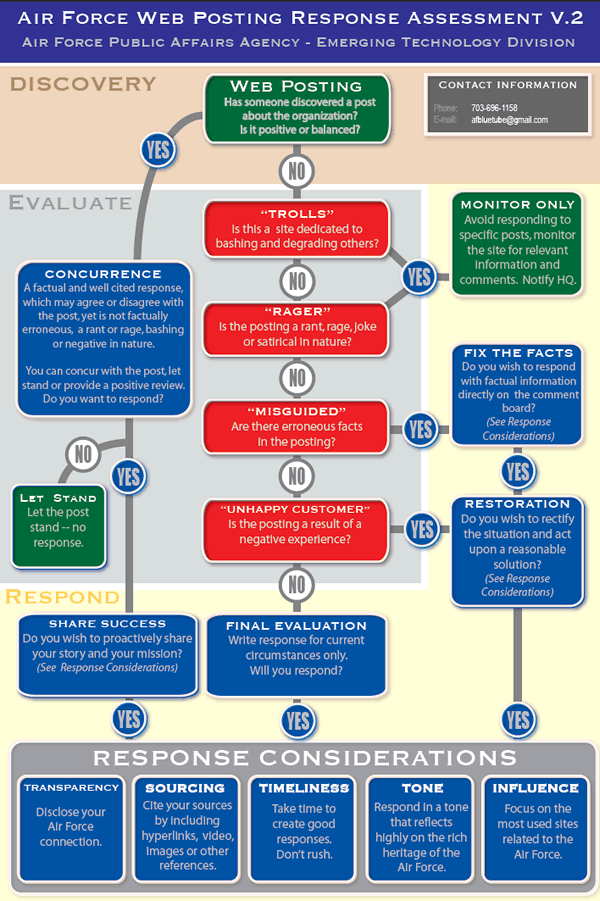Create Your Community Policies – SMPG Community Building Checklist
In our previous post, Design Your Presence, we discussed how to architect your presence in your community, a part of our community building checklist.
In this post, we continue posting our exclusive checklist that you can use to execute your project for building your community – The Social Media Performance Group Community Building Checklist™. We discuss how to design your community policies.
Create Your Policies
As part of your social media strategy, consider what policies should govern your enterprise’s social computing use
- Establish, in writing, best practices and procedures
- Ensure staff is on message
- Empower staff to be proactive and participative
- Position community as means to engage, not a distraction
- Create Rules of Engagement
- What to do with negative content
- What to do with negative members (more later)
- What to do with staff that blabs
- Study how the US Air Force deals with various types of community members, in the next figure

Figure 1 — Air Force Web Posting Assessment Flowchart[1]
- Decide whether to hold employees and other community members personally responsible for content they publish
- Decide how staff should Identify themselves in posts
- Decide if staff members who post elsewhere should add a disclaimer to their posts: “The postings on this site are my own and don’t necessarily represent [Organization’s] positions, strategies or opinions.”
- Encourage all members to respect copyright, fair use and financial disclosure laws and set penalties for non-compliance
- Confidentiality: Decide whether to prohibit citing or referencing clients, partners or suppliers without their approval
- Create a linkback policy for material reposted from other sources
- Create a prohibited language policy restricting hate speech, ethnic slurs, personal insults, obscenity
- If you are regulated, ensure all employees understand what can and cannot be said online
- Understand the legal ramifications of creating a public record or a public meeting by discussing topics online
- User-Generated Content (UGC) may need to comply with policy, copyright, trademark
- May need to treat information as part of records subject to retention policies
- Be careful out there: Some laws may restrict your ability to censor employees online:
- Political Opinions
- Many states, (such as California) prohibit employers from regulating their employees’ political activities
- Unionizing
- In many states, talking or writing about unionizing is strongly protected; union contracts may permit blogging; states may protect “concerted” speech — protecting two or more people who discuss workplace conditions
- Whistleblowing
- Many may believe reporting regulatory violations or illegal activities online is protected, but whistleblowers must report problems to the appropriate regulatory or law enforcement bodies first
- Reporting on Your Work for the Government
- Government workers writing online about their work is protected speech under the First Amendment except for classified or confidential information
- Legal Off-Duty Activities
- Some states may protect an employee’s legal off-duty blogging, especially if the employer has no policy or an unreasonably restrictive policy with regard to off-duty speech activities
- Reporting Outside Social Media Site Memberships
- Some organizations require employees to report other places where they contribute online
- Set Guidelines for At-Work Social Media Use
- Most enterprises believe that at-work use of social media saps productivity, but some studies find just the opposite.
- Political Opinions
- Review the following policies for ideas for your social media policy:[2]
- H&R Block’s Response Process — slidesha.re/q6agAL
- IBM Social Computing Guidelines — ibm.co/bNJl7V
- Nordstrom — bit.ly/oPbXPa
- SAP Social Media Participation Guidelines — scr.bi/pFxUJL
- Thomson Reuters — bit.ly/oLaWbe
- Walmart’s Twitter External Discussion Guidelines — bit.ly/nnKcU5
- Wells Fargo Blogs and Social Media — bit.ly/pp5bqs
Evolve Your Policies
Once the community is up and running, theory meets community practice, and you may need to evolve your rules
- Establish periodic policy reviews
- Involve your community in reviews
- Set the stage by designing various forums around key issues of interest
- Seed each forum with starter questions
- Have a forum for newbies called “Introduce Yourself”
- Have a forum called “What <product> Means to Me”
Create Your Community Policies is the 166th in a series of excerpts from our book, Be a Person: the Social Operating Manual for Enterprises (itself part of a series for different audiences). We’ve been doing this since 2011 and we’re just past page 407. At this rate it’ll still be a while before we get through all 430 pages, but luckily, if you’re impatient, the book is available in paper form at bit.ly/OrderBeAPerson and you can save $5 using Coupon Code 6WXG8ABP2
Get our new book, The Infinite Pipeline: How to Master Social Media for Business-to-Business Sales Success online here. You can save $5 using Coupon Code 62YTRFCV
What Others Are Saying
“Infinite Pipeline offers practical advice for using social media to extend relationship selling online. It’s a great way to get crazy-busy prospects to pay attention.”
—Jill Konrath, author of SNAP Selling and Selling to Big Companies
“Sales is all about relationships and trust. Infinite Pipeline is the ‘how to’ guide for maximizing social networks to find and build relationships, and generate trust in our digital age.”
—Sam Richter, best-selling author, Take the Cold Out of Cold Calling (2012 Sales book of the year)
“Infinite Pipeline will be the authority on building lasting relationships through online social that result in bottom line business.”
—Lori Ruff, The LinkedIn Diva, Speaker/Author and CEO of Integrated Alliances
[1] Air Force Web Posting Assessment Flowchart v.2 (PDF): bit.ly/dvdtGS
[2] See SocialMedia.biz for a great list of social media usage policies: bit.ly/cyou3a







